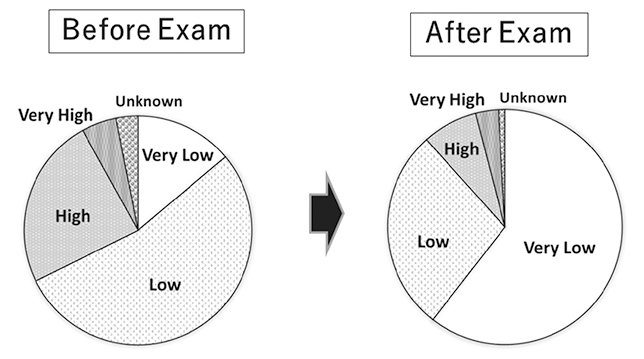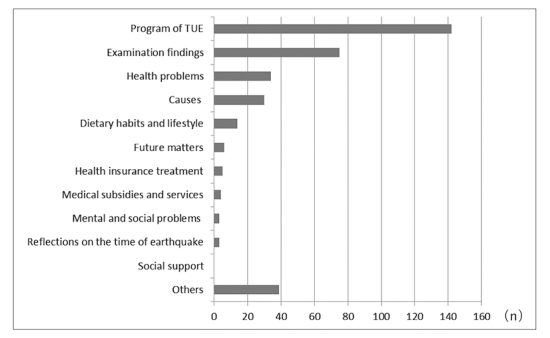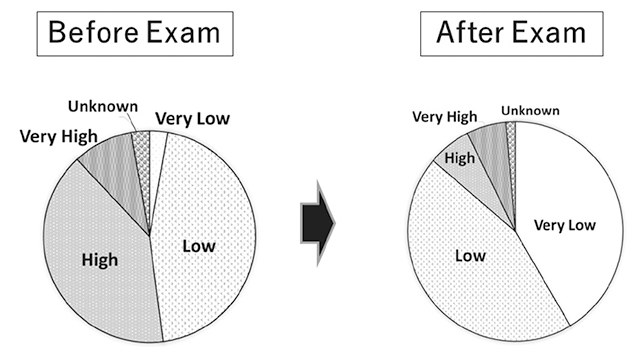在二次确认性检查期间对考生及其家属的社会心理支持:首次就诊时的支持记录分析。
IF 0.7
Q3 MEDICINE, GENERAL & INTERNAL
Fukushima Journal of Medical Science
Pub Date : 2021-08-27
Epub Date: 2021-08-07
DOI:10.5387/fms.2021-01
引用次数: 0
摘要
背景和目的甲状腺超声检查(TUE)项目是作为福岛健康管理调查的一部分进行的。按照既定的标准,考生被要求进行第二次确认检查,这可能会引起考生及其家人对甲状腺癌的高度焦虑。因此,福岛医科大学成立了甲状腺支持小组,以减少焦虑。本研究的目的是通过两种类型的记录来分析考生及其家庭的心理社会支持,并澄清当前的问题,确定未来的支持方向。材料与方法分析2018年9月至2019年3月在福岛医科大学进行的参加二次确认性检查的考生首次就诊的223份支持记录。结果首次访视时,考生及家属提出最多的话题和问题是“甲状腺超声检查(TUE)方案”和“检查结果”。甲状腺支持小组成员通过“回答问题”、“确认医生的解释”和“提供信息”等方式协助他们。考试后,考生及其家庭成员中高度焦虑的比例都有所下降。那些已经参加过二次确认性考试的人的焦虑水平较低。家庭成员的焦虑显著高于考生,考生与家庭的焦虑水平高度相关。结论考生及其家属的社会心理支持对减轻考生焦虑有重要作用。当前社会形势的变化和对高考的各种意见,使得对高考的详细解释和对考生及其家庭决策支持的需求增加。此外,我们应该考虑到考生的老龄化和扩大可用的社会心理支持。本文章由计算机程序翻译,如有差异,请以英文原文为准。



Psychosocial support for the examinees and their families during the secondary confirmatory examination:Analyses of support records at first visit.
Abstract Background and Purpose The Thyroid Ultrasound Examination (TUE) program is conducted as part of the Fukushima Health Management Survey. Following the established criteria, examinees are called in for a secondary confirmation examination, which may induce high anxiety related to a thyroid cancer for both the examinees and their families. Therefore, Fukushima Medical University created the Thyroid Support Team to reduce anxiety. The purpose of this study is to analyze the psychosocial support for examinees and their families through two types of records, and to clarify the current issues and determine future directions of support. Materials and methods We analyzed 223 records of support for the first visit of examinees who attended the secondary confirmatory examination, conducted at Fukushima Medical University from September 2018 to March 2019. Results During the first visit, frequent topics and questions brought up by the examinees and their families were about the “Thyroid Ultrasound Examination (TUE) program” and “Examination findings”. The Thyroid Support Team members assisted them by “Responding to questions”, “Confirming the doctor’s explanation” and “Providing information”. The percentage of people with high anxiety decreased in both examinees and their family members after the examination. The level of anxiety was lower among those who had already taken the secondary confirmatory examination. Family members’ anxiety was significantly higher than that of the examinees, and anxiety levels were highly correlated between examinees and their families. Conclusion The psychosocial support for examinees and their families was important in reducing their anxiety. Currently there are changes in social conditions and various opinions concerning the TUE. Thus, careful explanation and the need for decision-making supports for the examinees and their families increased. Also, we should take into account the aging of the examinees and expanding the available psychosocial support.
求助全文
通过发布文献求助,成功后即可免费获取论文全文。
去求助
来源期刊

Fukushima Journal of Medical Science
MEDICINE, GENERAL & INTERNAL-
CiteScore
1.70
自引率
12.50%
发文量
24
 求助内容:
求助内容: 应助结果提醒方式:
应助结果提醒方式:


